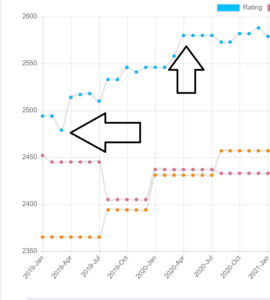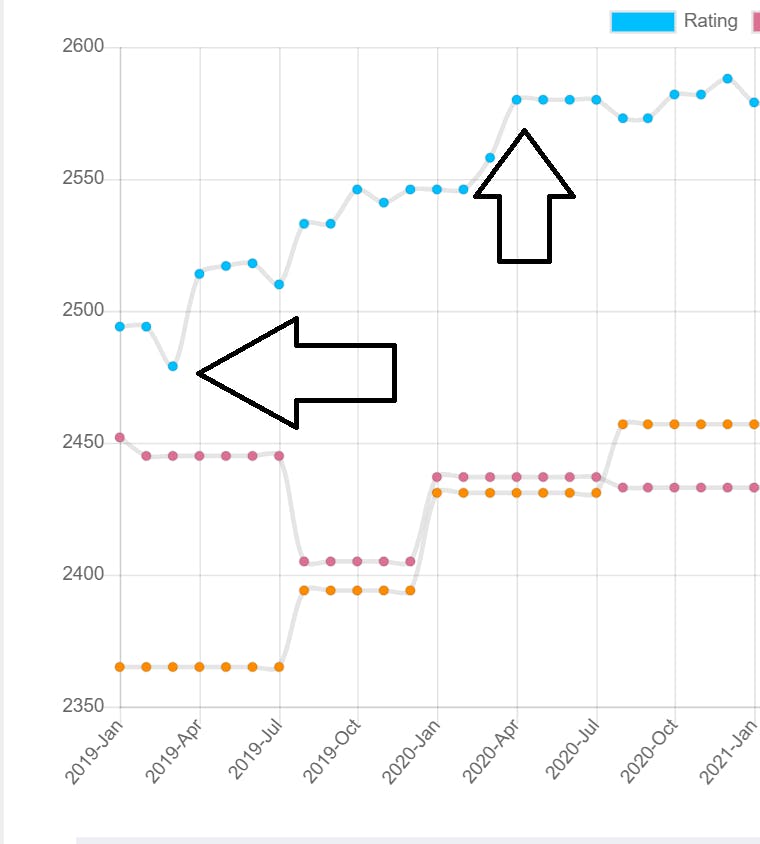This is Day 3 of my 7-Day series to kickstart your Chess Training. Each part stands on its own, but they are the most powerful if you read and apply all 7 days consecutively.
Training should be harder than competition. This is a phrase I’ve heard hundreds of times before.
But I never felt it as much as I felt it in May 2019. I thought of myself as an ambitious young GM working hard on his game. Then I took part in a Quality Chess Training Camp with World-renowned Coaches GM Jacob Aagaard and GM Ramesh RB.
And I realized what hard training really looks like. After a tough test with 12 positions (I managed to solve only 4 of them) in the morning with Aagaard it was time for the first session with Ramesh.
After a short introduction on why hard training is necessary, and what it should look like, he put up a tough position on a screen.
We had a minute or so to memorize it and get a grasp on it.
Then he switched off the screen and we were on our own. No board. No screen. Just our minds and a super complex position to calculate.
I’ve never seen a group of IMs and GMs so overwhelmed (admittedly, there were some like GM Shankland who had less trouble than me).
For roughly an hour we contemplated different lines until after many wrong attempts and requests to repeat the position or lines we were discussing, we got to the right solution.
One hour for one position, all in our head. Insanely difficult. But very eye-opening.
That’s what hard training really looks like.
Why Hard Chess Training is So Beneficial

Obviously, this training camp wasn’t the sole reason for my considerable rating gains. But it gave me some insights into why so many Indian kids, many of them students of Ramesh, are having such incredible results.
When training is very hard, competition nearly feels like play.
Nothing will ever be as demanding as figuring out a super hard position in your head for 1 hour. So whenever a tough position arose on the board, I told myself it couldn’t be as bad as training with Aagaard & Ramesh, did my best to calculate some of the lines, and played the move I thought was best.
If you observe the Indian prodigies, you will realize they all thrive in extremely complex positions. No wonder! They do this kind of training from a very young age.
Ramesh’s point is exactly to make them used to discomfort, chaotic positions, and making mistakes.
For a long time, these exact things were causing me a lot of trouble. I outplayed my opponents, but whenever chaos ensued on the board, even if it was objectively good or even winning for me, my heart started pumping, and I got nervous and afraid.
Most of the time, before I could recompose, I already made a fatal mistake.
The Comfort Crisis
I realize I’m not alone in this. In a world that always gets more comfortable for most, doing something hard is sometimes seen as unnecessary. Chess is a good training ground to get comfortable with discomfort.
Every game features a position you haven’t seen before. And in every game, we make mistakes. Perfection is impossible, even for Magnus Carlsen. The problem is that if you only do what is comfortable in training, you won’t be prepared for the inevitable new positions that arise during a game.
Repeat that after me: I can’t escape from discomfort during games. I will be out of my prep at some point. I will face difficult positions. And I will make mistakes.
The best way is to fully accept it and prepare yourself for discomfort. This is easiest (pun intended) done by doing hard things in training.
Training Hard Makes You Happier
Hard stuff leads to better results. Nothing new under the sun. What was new for me, and might be for many readers as well, is that doing hard stuff might help you recharge better than doing easy things.
Cal Newport writes in Digital Minimalism (yup, I love this book):
“Expending more energy in your leisure, Bennett tells us, can end up energizing you more.” and “… if you instead rouse the motivation to spend that same time actually doing something – even if it’s hard – you’ll likely end the night feeling better.”
There it is. Getting your ass off the couch and doing something demanding can make you feel better.
Thinking about my own leisure activities, I definitely agree with this. If I lie on the couch for too long, I end up feeling tired and sad about my ‘wasted’ time. I have the same feeling after a silly blitz marathon, which only ever ends in losing rating points and wishing I could erase the past 2 hours entirely.
Instead, if I force myself to go work out at the gym, I come back home feeling energized and proud of myself.
Don’t get me wrong. I hate every second of it. You don’t need to love to solve difficult puzzles. You just need to get yourself to do them.
Do Something Hard, Now
Enough explaining. I hope the above was convincing enough. But just reading it doesn’t suffice. Knowing isn’t doing. The only thing that works is action.
Today, I challenge you to:
- Do something hard now
- Plan something hard for tomorrow
- Plan something hard for after-tomorrow
If you are doing the Chess Detox, get creative and do another activity that is hard. The beauty is that doing hard things in one area of life will have a ripple effect on all other parts of your life. Some ideas:
- Go to the gym and push yourself; the goal is that your muscles remind you of your session tomorrow
- Write a letter to a loved one (if that’s something you don’t usually do)
- Ask your crush out
- Have a hard conversation with someone
I’m sure you have something you know you should do but push away because it is hard and uncomfortable. Now is the time to do it.
Doing something now, tomorrow, and after tomorrow will get you into a habit of doing hard things. Again, it’s amazing if you even fall in love doing those, but that’s not the point. You simply need to find ways to trick yourself into doing the hard things.
For your future Chess training, make it a routine to do something really hard at least once a week. You will learn how to implement this into your own training plan later on in the series.
What Is Hard Chess Training For You?
Hard Chess training usually involves using your own head to solve difficult positions that are a little bit harder than what you can usually solve.
ATTENTION: Solving positions from a book for GMs, blindfolded if you are rated 1500 and never solved a blindfold puzzle before is not hard training, but a waste of time.
Remember the 2:1 ratio for achieving your goals mentioned in the last email. This is a good benchmark to find something hard, but that still makes sense for your level. If you are rated 1500, but always play training games against someone rated 1700, you can still get positive results from time to time, learn from the games, and games against 1500s will feel less hard.
That’s smart, hard training.
Once you get into the habit of doing hard things in training, you will not only improve your chess quicker but also be more proud of yourself and enjoy chess more.
Don’t take it from me, here is what Tom Bus said after three months of following his hard chess training plan, constructed with the help of my course Next Level Training:
“My calculation and my assessment of a chess position have improved. My time management of the game (OTB) is better. During the games, I have much more confidence than before. I am more relaxed in playing equal positions and I am not afraid anymore of playing long games. Furthermore, I make less blunders or mistakes than I used to do.”
Keep improving,
Noël
Want to read on? Day 4 – Strategic Chess Training: Maximize Impact with the 80/20 Principle
